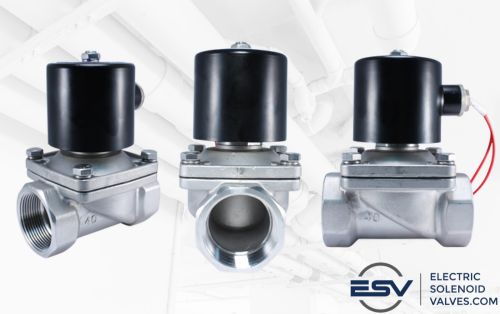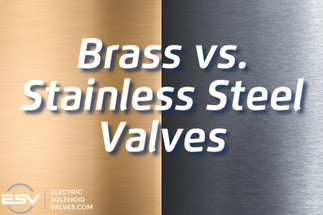Jun 23rd 2021
Brass vs. Stainless Steel Valves
Selecting the proper materials for your plumbing system is a hefty responsibility. You've got to consider price points, durability, and corrosion resistance, and potential safety hazards.
It's a tough choice, so it's best to use the guide below to ensure you get the right component when choosing between brass vs stainless steel valves.
Brass vs Stainless Steel Valves: Which is Better?
Numerous differences separate the quality of brass and stainless steel valves for one reason or another. While brass is an excellent general-purpose metal you can use in a broad range of plumbing jobs, stainless steel has other applications that might make it the superior choice instead.
For one, stainless steel valves are much better in terms of corrosion resistance. In fact, this is the main reason why these components are approved by the Food and Drug Administration for handling food and beverage, while brass valves are not.
Still, this doesn't mean it's invulnerable to corrosion. Different types, such as the kind that causes red stains or green-blue stains to appear on the surface or the one that causes leaks, can still affect stainless steel valves. Stainless steel valves can also last much longer than brass and can resist higher temperatures.
On the other hand, brass valves are the preferred option in many residential and commercial plumbing systems. It's also a much better choice for welding, which can reduce labor costs and project duration.
Because of their different strengths and weaknesses, brass or stainless steel valves can't be named objectively better than one or the other. Instead, you might find that one suits your needs more conveniently by reading through the following pros and cons.
Understanding Brass and Stainless Steel Valves
Brass Valves
 Brass valves, crafted from an alloy of copper and zinc, are a popular choice because they are affordable and versatile. As noted above, brass is often the material of choice for residential and commercial plumbing systems. It's also widely appreciated in the petrochemical and marine industries due to its relatively high corrosion resistance, malleability, and durability.
Brass valves, crafted from an alloy of copper and zinc, are a popular choice because they are affordable and versatile. As noted above, brass is often the material of choice for residential and commercial plumbing systems. It's also widely appreciated in the petrochemical and marine industries due to its relatively high corrosion resistance, malleability, and durability.
Yet, not everything about brass valves is perfect. Here's a balanced look at the possible pros and cons of working with brass valves
Pros:
- Cost-effective: Brass valves are usually less expensive than their stainless steel counterparts.
- Easier to work with: Brass is malleable, making it easier to weld or manipulate during installation.
- Corrosion resistance: Brass offers good resistance to corrosion in many environments.
- Suitable for moderate pressure applications: Ideal for residential plumbing and certain commercial systems.
- Antimicrobial properties: Inhibits bacterial growth, making it suitable for potable water systems
- Good thermal conductivity: Efficient in applications involving heat transfer
- Durable: Long-lasting when properly maintained
Cons:
- More prone to corrosion: While brass resists corrosion better than some metals, it’s still more vulnerable than stainless steel, especially in harsh environments.
- Potential for lead contamination: Brass valves may contain lead, which can pose risks in systems carrying drinking water. Look for no-lead options if you’re considering using brass valves for potable water.
- Not ideal for saltwater: Brass is not recommended for saltwater or highly corrosive environments.
- Dezincification: Can occur in certain aggressive water conditions, leading to weakening
- Low temperature and pressure range: Brass is not recommended for extremely high temperatures or pressures
Stainless Steel Valves
 Stainless steel valves, including stainless steel solenoid valves, are composed of iron, chromium, and often nickel or molybdenum. They are known for their durability, resistance to corrosion, and longevity across several industries. These qualities make stainless steel the preferred choice for demanding environments, including marine applications, chemical processing plants, and systems handling food and beverages.
Stainless steel valves, including stainless steel solenoid valves, are composed of iron, chromium, and often nickel or molybdenum. They are known for their durability, resistance to corrosion, and longevity across several industries. These qualities make stainless steel the preferred choice for demanding environments, including marine applications, chemical processing plants, and systems handling food and beverages.
Some might be tempted to think that this metal is inherently better than brass in its entirety.Yet, stainless steel valves do have some weaknesses that may cause you to reconsider which is best between brass vs stainless steel valves. Here are some key points to keep in mind.
Pros:
- Superior corrosion resistance: Stainless steel, especially 316-grade, excels in environments prone to corrosion, including acidic and alkaline conditions.
- Hygienic and FDA-approved: Stainless steel's smooth, non-porous surface makes it easy to clean and sanitize, making it ideal for food and pharmaceutical applications.
- High temperature and pressure resistance: Stainless steel valves can withstand extreme conditions, making them suitable for high-performance applications.
Cons:
- Higher cost: Stainless steel valves are generally more expensive upfront compared to brass valves.
- Heavier: Stainless steel’s density can be a factor in applications where weight matters.
- Lower thermal conductivity: Compared to brass, stainless steel has lower thermal conductivity, which might be a consideration in applications involving heat transfer.
- Magnetic properties: Some grades are magnetic, which may be undesirable in certain applications.
Comparison Table – Brass vs Stainless Steel Valves
When to Use Brass vs When to Use Stainless Steel
Best Applications for Brass Valves
- Residential and commercial plumbing systems
- Non-corrosive environments where brass’s moderate corrosion resistance suffices
- Budget-sensitive projects where cost-effectiveness is critical
Best Applications for Stainless Steel Valves
- Marine systems: With high corrosion resistance, stainless steel thrives in saltwater environments.
- Chemical industries: Ideal for resisting harsh chemicals and ensuring system longevity.
- High-pressure and food-grade systems: Stainless steel is FDA-approved and handles extreme pressure and temperature conditions.
Corrosion Susceptibility: A Deep Dive
Corrosion is a natural process that degrades materials which can pose a significant threat to the longevity and reliability of valves. Corrosion resistance can make or break the effectiveness of a valve in certain applications.
Brass, while moderately resistant to corrosion, doesn’t hold up as well as stainless steel in saltwater or chemical-heavy environments. It is also susceptible to dezincification, a process where zinc leaches out of the alloy, weakening the material. For more aggressive environments, stainless steel offers the best resistance to both pitting and general corrosion.
Keep in mind that there are many different grades of stainless steel used for making valves, such as 304 and 316. These two are among the most popular types of stainless steel valves, also used for marine water and food production.
Pay attention to the number, because this will tell you a bit about the elemental makeup and its unique strengths.
For example, stainless steel 304 valves are highly corrosion resistant because of their high nickel concentrations. However, 316 would be the better choice to defend against corrosion because of the presence of nickel and molybdenum (a chemical compound that contributes to the steel's strength and hardness).
Let's break down the types of corrosion that brass and stainless steel valves might encounter:
Brass Valves
- Dezincification: This is a major concern for brass, especially in acidic or high-chlorine environments. Zinc leaches out of the alloy, leaving a porous, weakened copper structure prone to leaks and failure
- Stress Corrosion Cracking (SCC): Brass can crack under stress in the presence of certain corrosive agents like ammonia or mercury.
- General Corrosion: While brass has decent general corrosion resistance, prolonged exposure to harsh chemicals or extreme temperatures can lead to material loss.
- Galvanic Corrosion: If brass is in contact with a more noble metal (like stainless steel) in a corrosive electrolyte, it can corrode preferentially.
Stainless Steel Valves
- Pitting Corrosion: Although highly resistant, stainless steel can pit in the presence of chlorides (especially at high temperatures or stagnant flow conditions). Small holes form and can penetrate the metal.
- Crevice Corrosion: In tight spaces with limited oxygen access (e.g., under gaskets), stainless steel can experience accelerated corrosion.
- Intergranular Corrosion: Improper heat treatment or welding can sensitize stainless steel, making it susceptible to corrosion along grain boundaries.
- Stress Corrosion Cracking (SCC): While less common than in brass, stainless steel can still crack under stress in specific environments (e.g., high chloride concentration and high temperature).
- Intergranular Corrosion: Certain stainless steel grades can become susceptible to corrosion along grain boundaries if they're improperly heat-treated or exposed to specific temperature ranges.
Learn more about the different types of corrosion that can affect valves in our chemical and material compatibility guide.
FAQ - Brass vs Stainless Steel Valves
Q: Which is better: brass or stainless steel valves?
A: It depends on the application. Brass valves are cost-effective for residential plumbing and low-pressure systems, while stainless steel valves excel in high-pressure, marine, and food-grade environments.
Q: What are the pros and cons of stainless steel valves?
A: Stainless steel valves are highly durable and corrosion-resistant, but they come with a higher cost and are heavier than brass.
Q: Is brass better than stainless steel for water?
A: Brass works well for general plumbing and non-corrosive water systems. However, stainless steel is the better choice for drinking water, saltwater or chemical-heavy environments.
Q: Does brass corrode in saltwater?
A: Yes, brass is susceptible to corrosion and dezincification in saltwater. Stainless steel is a more suitable option in such cases.
Q: Can you use brass for drinking water?
A: Yes, as long as it’s a lead-free brass valve, it can be safely used in drinking water systems.
Conclusion
Choosing between brass and stainless steel valves depends on your specific needs. Brass valves are cost-effective and suitable for moderate conditions, while stainless steel valves offer superior durability and corrosion resistance for demanding environments. For expert advice on selecting the right valve, contact us or explore our comprehensive product pages.
Ready to Choose the Right Valve?
Explore our collections of brass and stainless steel valves today:
- Brass Valves
- Stainless Steel Valves

